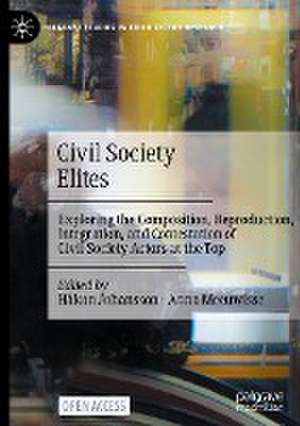Civil Society Elites: Exploring the Composition, Reproduction, Integration, and Contestation of Civil Society Actors at the Top: Palgrave Studies in Third Sector Research
Editat de Håkan Johansson, Anna Meeuwisseen Limba Engleză Hardback – 29 dec 2023
| Toate formatele și edițiile | Preț | Express |
|---|---|---|
| Paperback (1) | 355.31 lei 6-8 săpt. | |
| Springer International Publishing – 29 dec 2023 | 355.31 lei 6-8 săpt. | |
| Hardback (1) | 360.95 lei 3-5 săpt. | +30.55 lei 7-13 zile |
| Springer International Publishing – 29 dec 2023 | 360.95 lei 3-5 săpt. | +30.55 lei 7-13 zile |
Preț: 360.95 lei
Nou
Puncte Express: 541
Preț estimativ în valută:
69.07€ • 73.86$ • 57.59£
69.07€ • 73.86$ • 57.59£
Carte disponibilă
Livrare economică 27 martie-10 aprilie
Livrare express 13-19 martie pentru 40.54 lei
Preluare comenzi: 021 569.72.76
Specificații
ISBN-13: 9783031401497
ISBN-10: 3031401492
Pagini: 332
Ilustrații: XXII, 332 p. 11 illus., 10 illus. in color.
Dimensiuni: 148 x 210 x 26 mm
Greutate: 0.58 kg
Ediția:1st ed. 2024
Editura: Springer International Publishing
Colecția Palgrave Macmillan
Seria Palgrave Studies in Third Sector Research
Locul publicării:Cham, Switzerland
ISBN-10: 3031401492
Pagini: 332
Ilustrații: XXII, 332 p. 11 illus., 10 illus. in color.
Dimensiuni: 148 x 210 x 26 mm
Greutate: 0.58 kg
Ediția:1st ed. 2024
Editura: Springer International Publishing
Colecția Palgrave Macmillan
Seria Palgrave Studies in Third Sector Research
Locul publicării:Cham, Switzerland
Cuprins
Chapter 1: Civil society elites.- Chapter 2: The Danish civil society elite 1910–2020.- Chapter 3: Mirroring the masses? A cross-national comparison of civil society elite composition.- Chapter 4: Organisational, reputational, and visible leaders.- Chapter 5: Consecrating civil society elites in Europe.- Chapter 6: Elite integration through volunteerism.- Chapter 7: Reproduction of elites in Hong Kong through the Hong Kong Jockey Club.- Chapter 8: Civil society boundary crossing and elite integration.- Chapter 9: The interstitial elites of the Italian foundations of banking origin.- Chapter 10: Networks of interlocking leaders among civil society organisations in four European countries.- Chapter 11: Contestation of civil society elites.- Chapter 12: The state as a challenger to civil society elite: the case of Poland.- Chapter 13: Who gets a seat at the table? Identifying incumbents and challengers in the European Parliament’s civil society consultations on animal welfare.- Chapter14: Michels, Mills, and civil society elites.
Notă biografică
Håkan Johansson is Professor of Social Work at Lund University, Sweden. He has a long-standing interest into studies of civil society, which includes street protests, social movements, lobbying and advocacy as well as studies into Europeanisation of civil societies and civil society elites.
Anna Meeuwisse is Professor of Social Work at Lund University in Sweden. Her main research interests are social movements and the role of civil society in welfare states. In recent years, she has conducted research on the Europeanisation of Swedish civil society, elitisation processes, and on transnational conservative movements that oppose sexual and reproductive rights.
Anna Meeuwisse is Professor of Social Work at Lund University in Sweden. Her main research interests are social movements and the role of civil society in welfare states. In recent years, she has conducted research on the Europeanisation of Swedish civil society, elitisation processes, and on transnational conservative movements that oppose sexual and reproductive rights.
Textul de pe ultima copertă
This open access book introduces a groundbreaking concept - civil society elites - and serves as an essential resource for scholars, researchers and students interested in the complexities of power and influence within contemporary civil societies. Through a series of unique empirical studies, the authors offer a comprehensive examination of the individuals occupying the upper echelons of influential civil society organisations and movements. By delving into the factors that propel individuals into key positions and examining the connections between civil society leaders within and across sectors, the book offers insight into the mechanisms that shape access to powerful positions in civil societies. As a reflection of current debates on elites and populism, the book furthermore explores the expression and conceptualisation of counter-elite positions and criticism of civil society elites. With its original approach, the book serves as a catalyst for further research into inequalities, power structures and elites within civil societies.
Håkan Johansson is Professor of Social Work at Lund University, Sweden. He has a long-standing interest into studies of civil society, which includes street protests, social movements, lobbying and advocacy as well as studies into Europeanisation of civil societies and civil society elites.
Anna Meeuwisse is Professor of Social Work at Lund University, Sweden. Her main research interests are social movements and the role of civil society in welfare states. In recent years, she has conducted research on the Europeanisation of Swedish civil society, elitisation processes, and on transnational conservative movements that oppose sexual and reproductive rights.
Caracteristici
This book is open access, which means that you have free and unlimited access Provides a timely intervention into contemporary social scientific debates on elites, populism and inequalities Presents the first systematic cross-country comparative investigation of civil society elites Contributes to current academic debates on ‘transforming civil societies’






